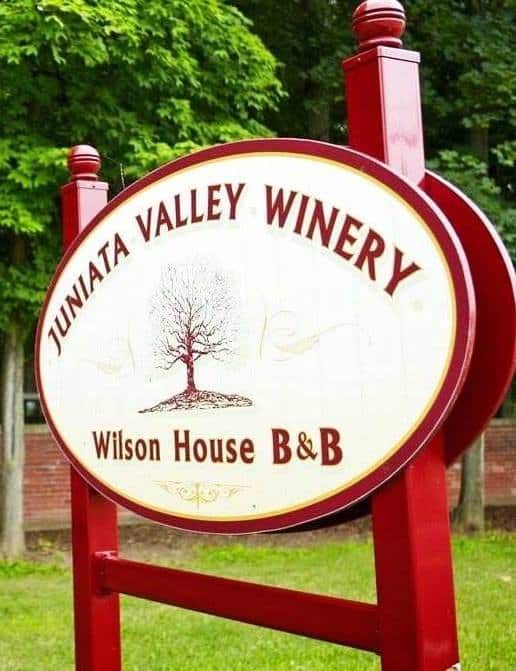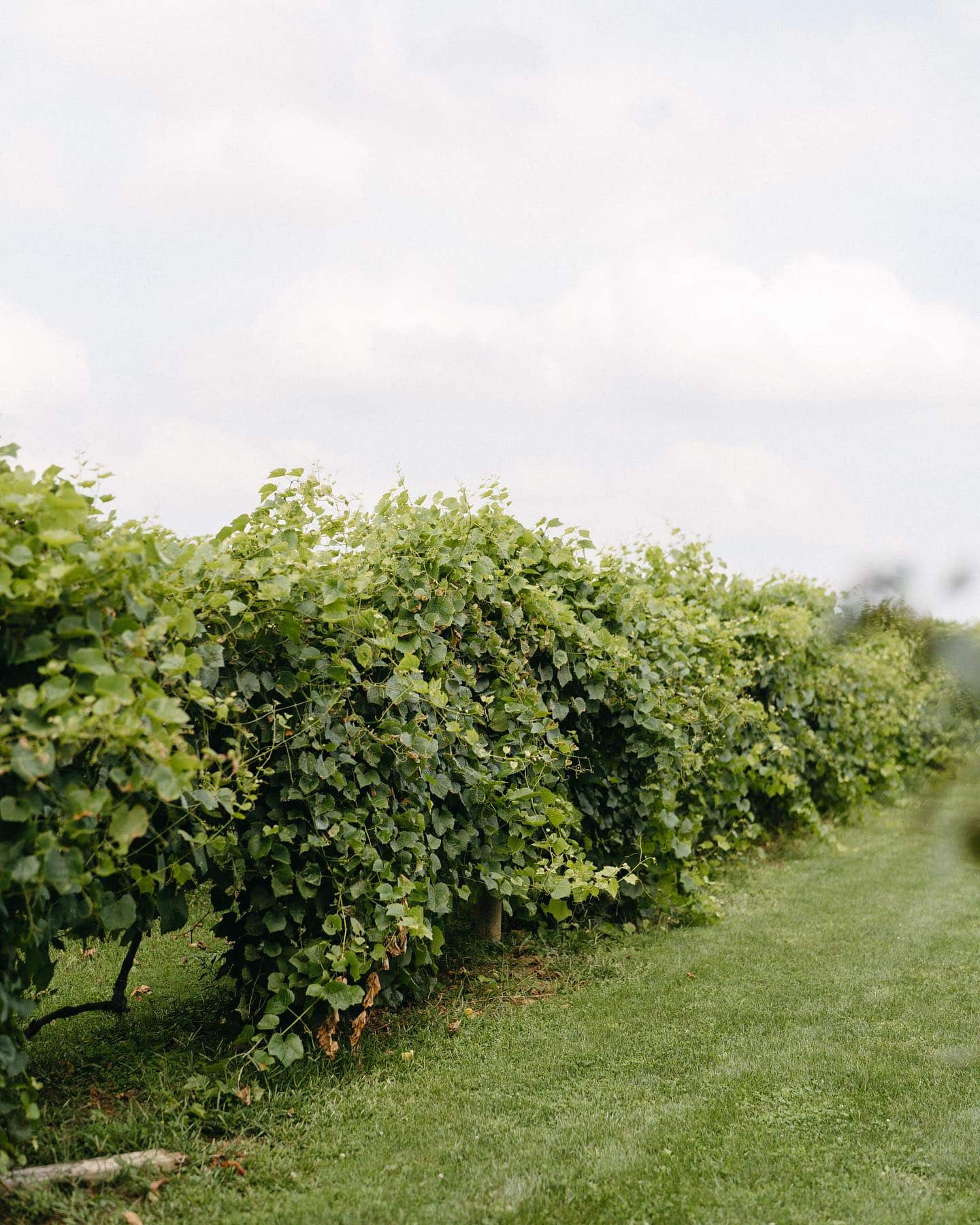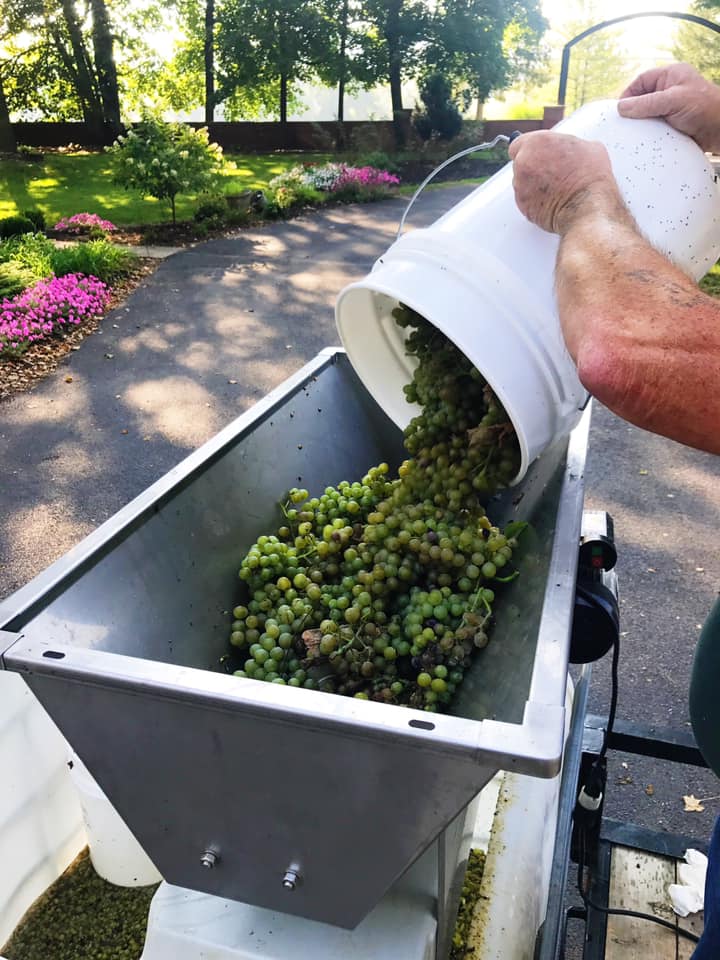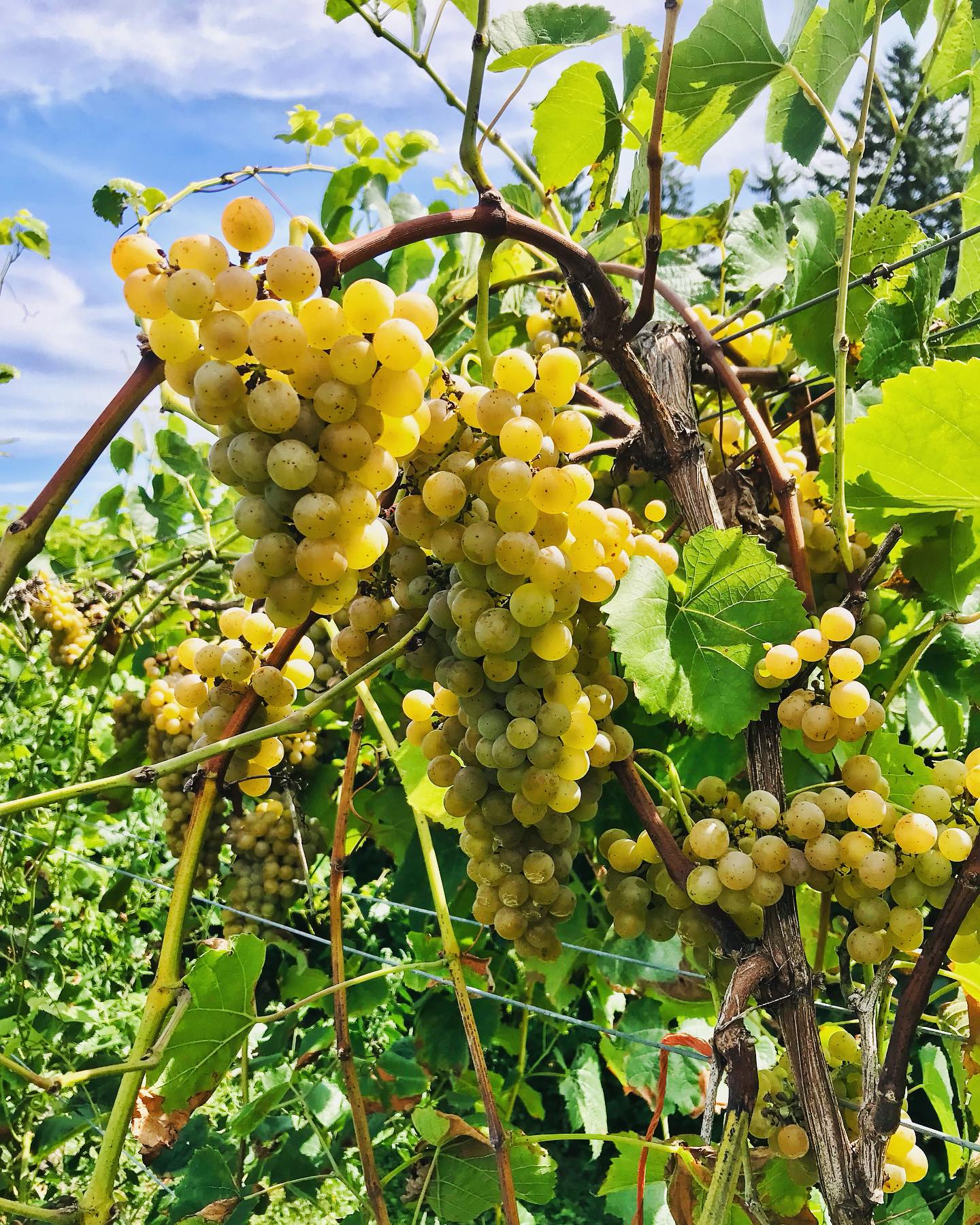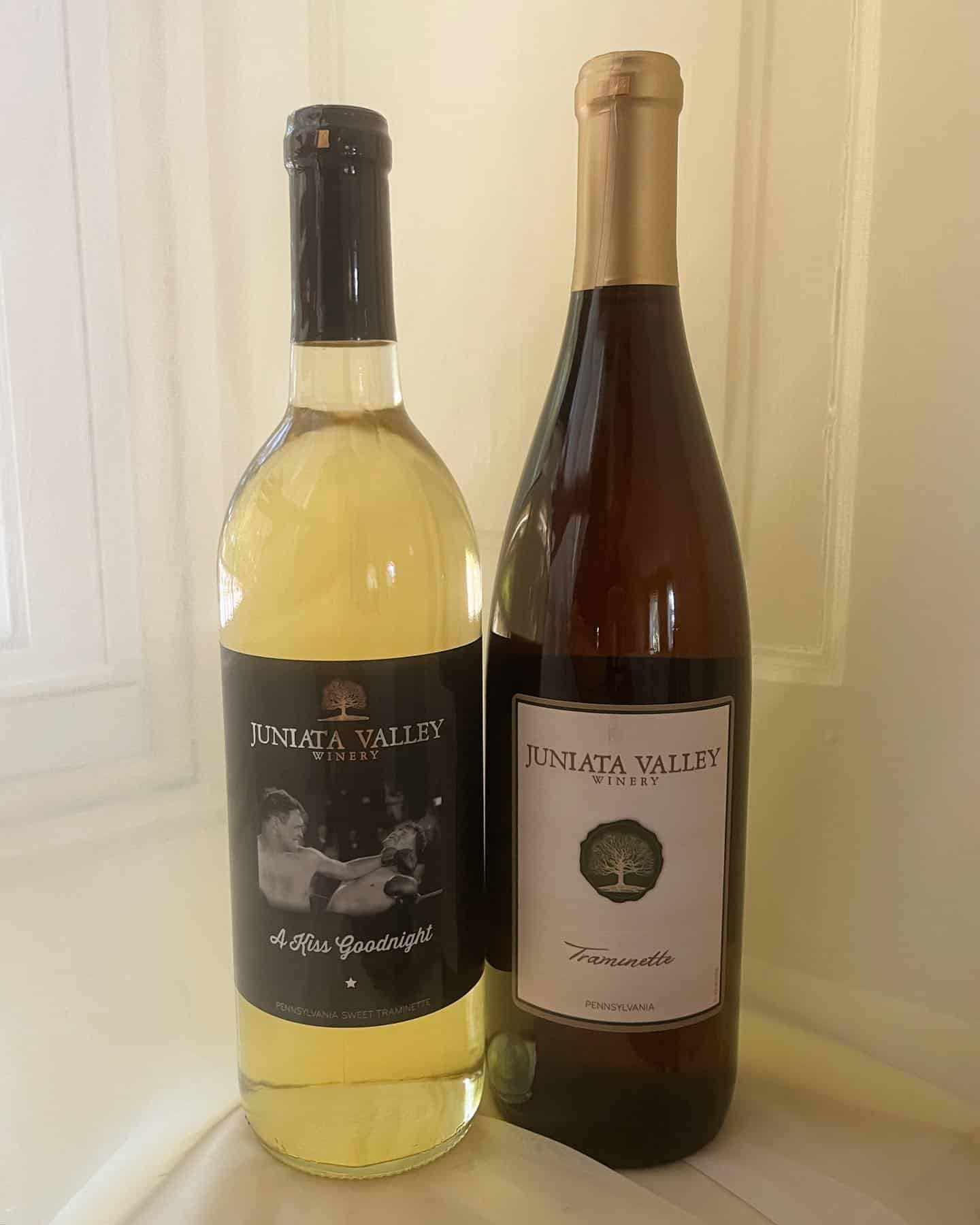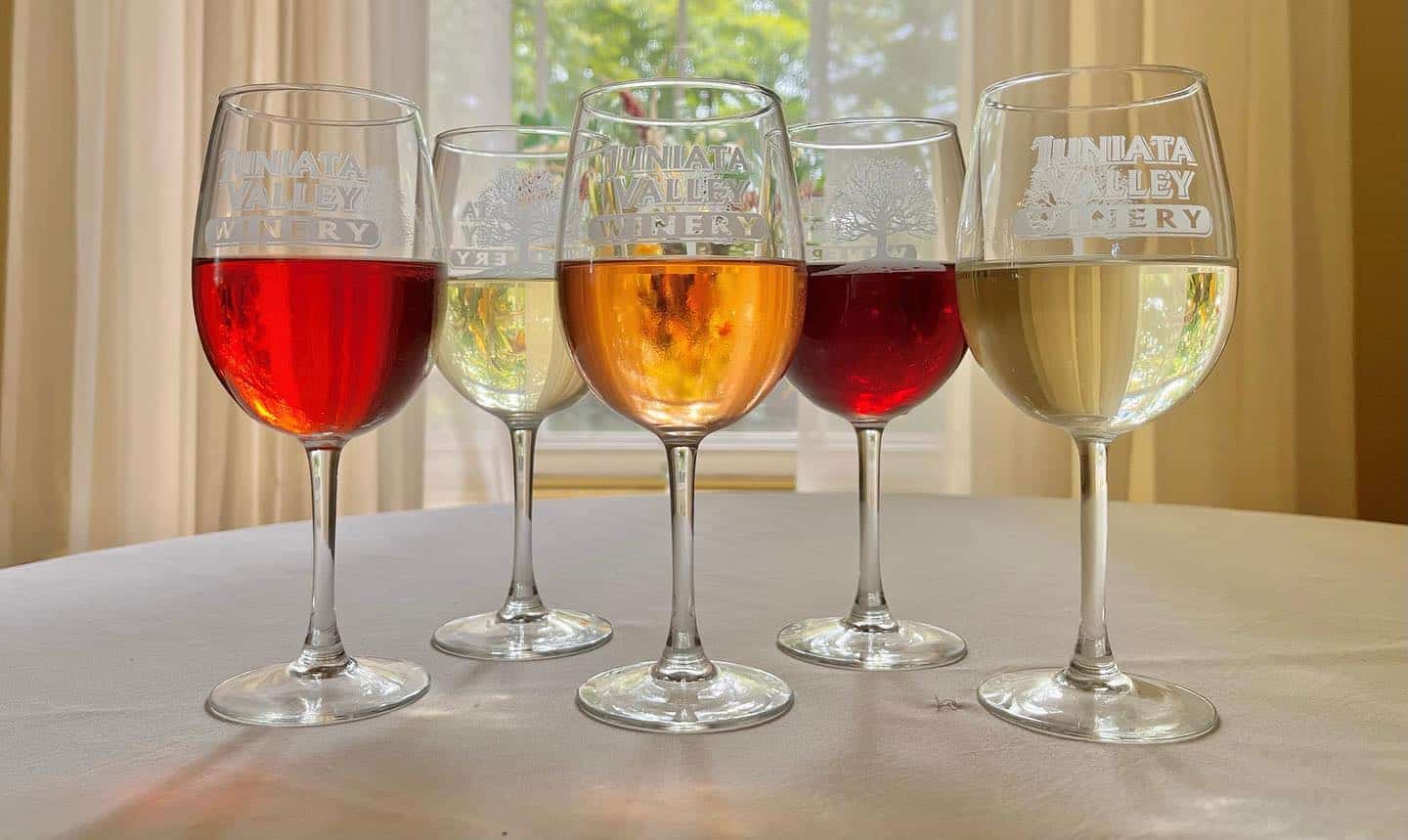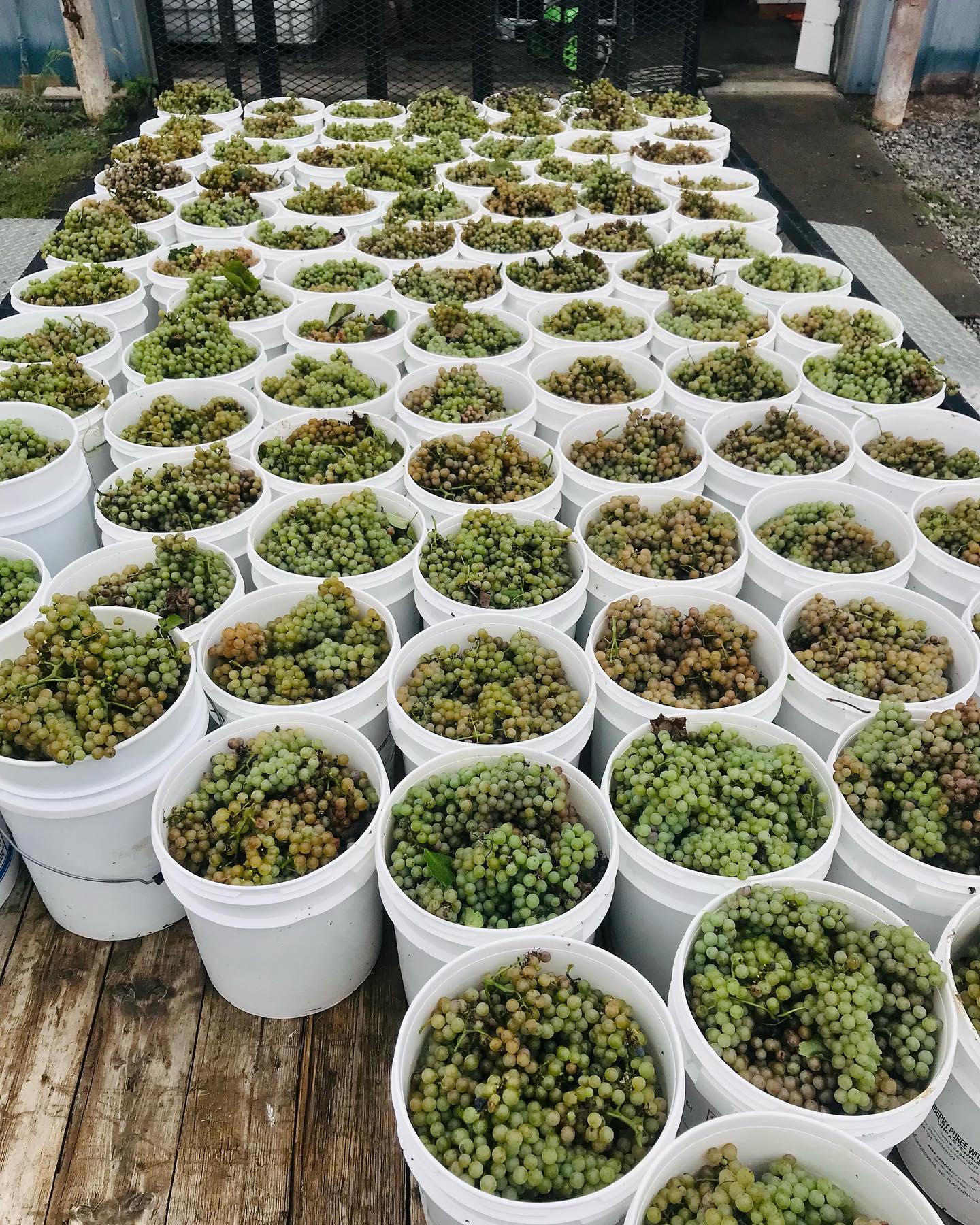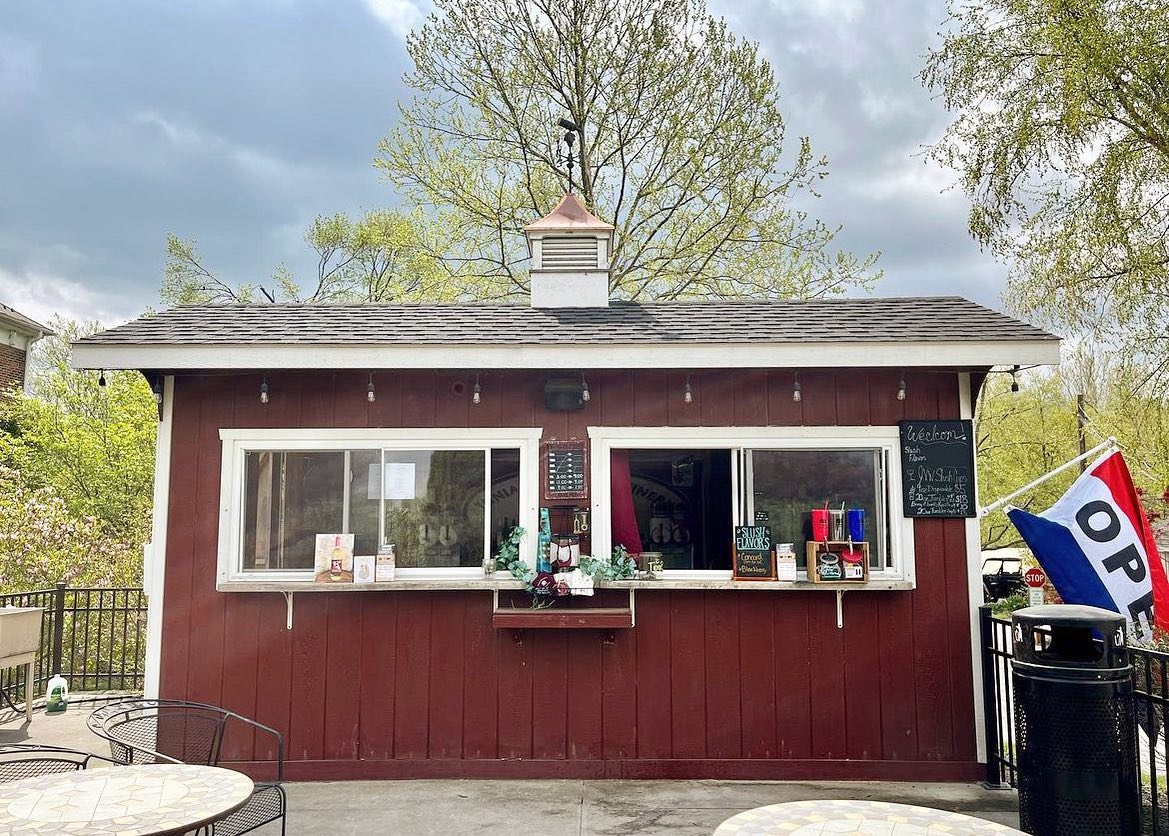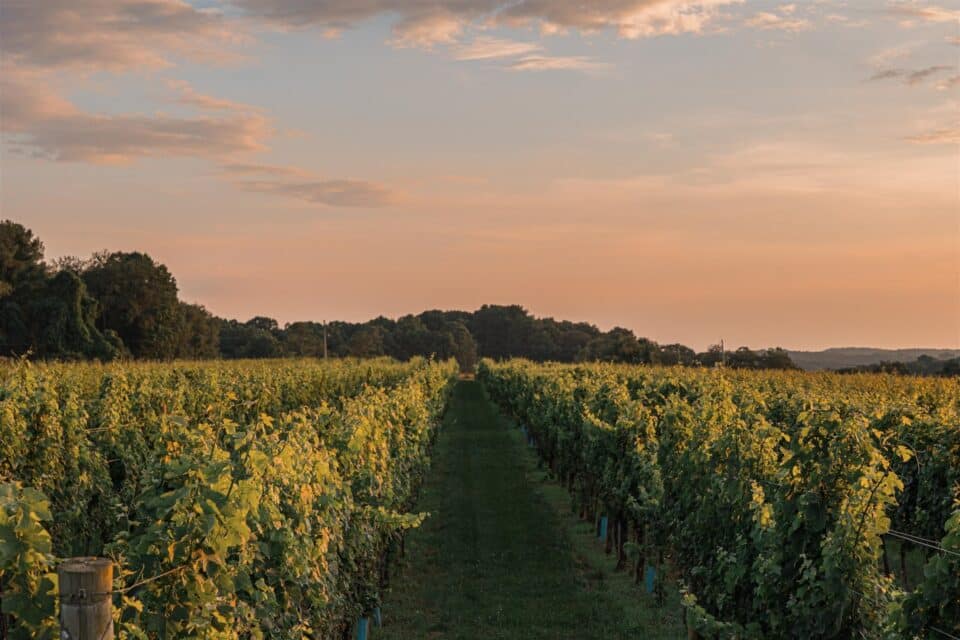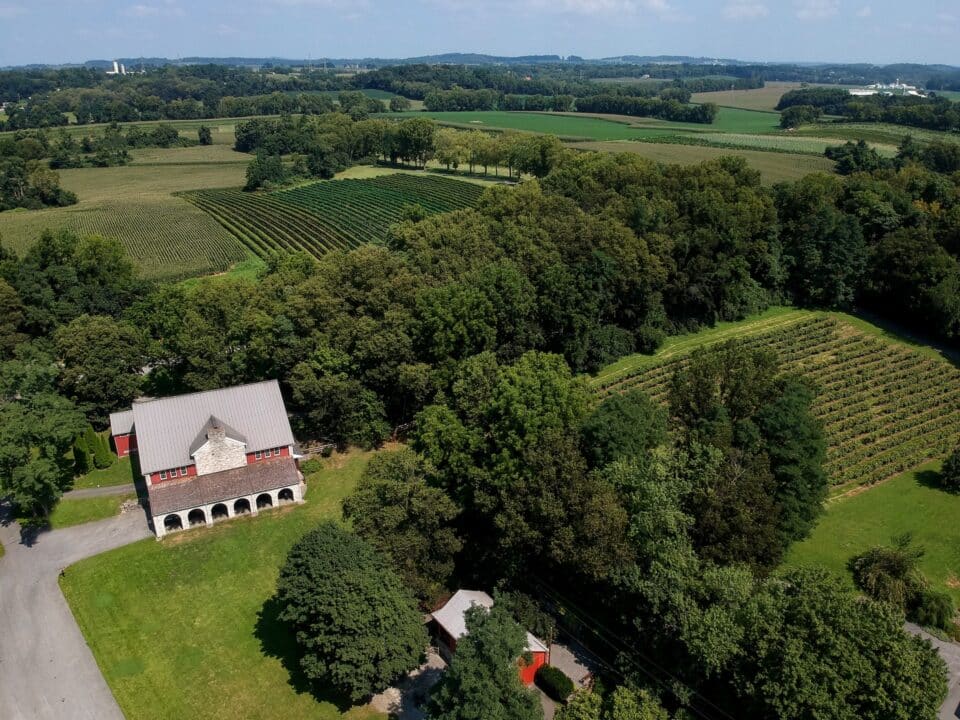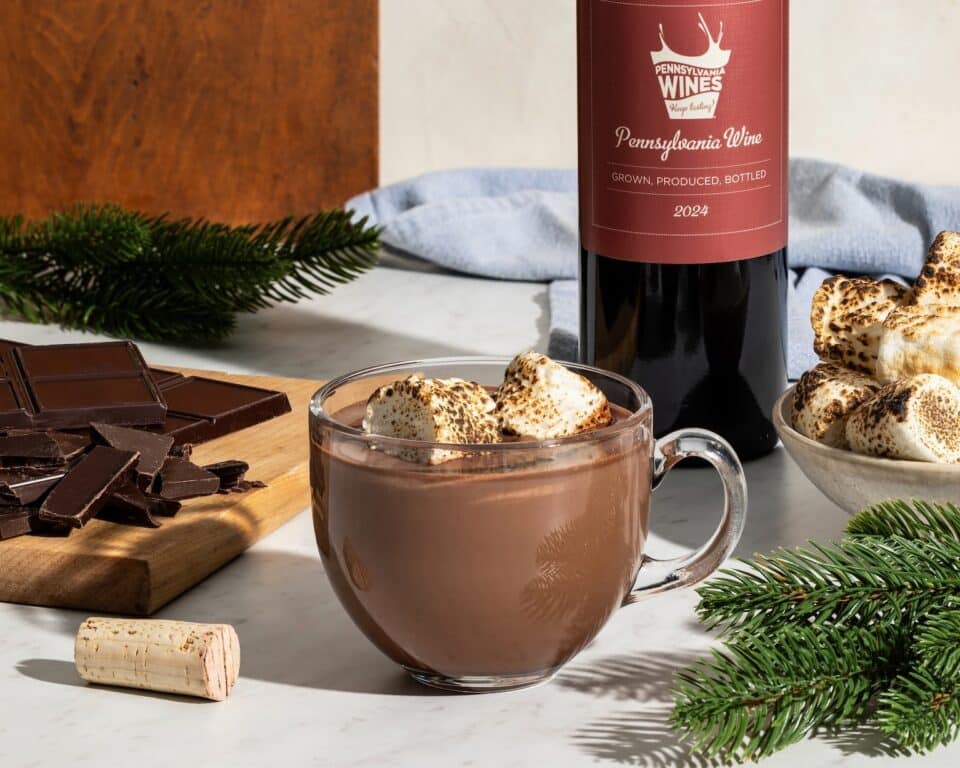Traminette is a little powerhouse of a grape that produces spectacular white wines. It’s a hybrid with German and French roots that thrives on Pennsylvania’s German-like terroir. Traminette wines are typically floral and aromatic, on the drier side, and with the structured yet lean body of Alpine-style wines. They make a lovely — and delicious — addition to any nuanced portfolio.
We spoke with George Hazard of Juniata Valley Winery in central Pennsylvania. He told us about Traminette’s unique qualities, and what makes it so beautifully suited for growing in PA. As the first grape he and his wife planted, it essentially launched them as professional wine producers, and they have since built a magnificent hospitality venture with wine as its keystone.
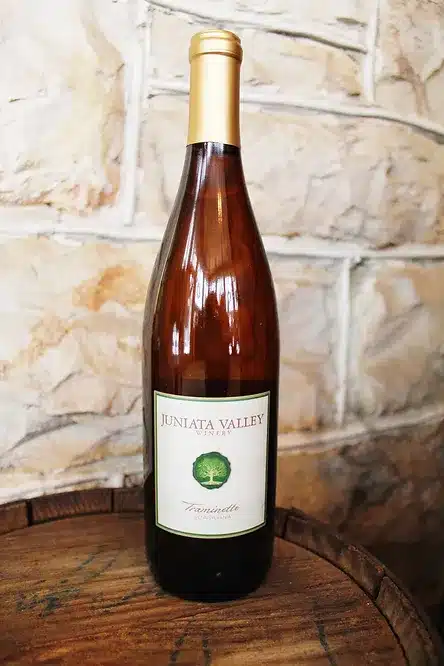
PA Eats: Can you give us a background on your winery’s founding, and how you got into grape growing and wine production?
George Hazard: Back around 2009, my wife and I visited some of the New York wineries and really had a good time. We enjoyed the atmosphere and what they were doing. At the time, wineries in central PA were not very popular. Very few existed. So, we came back and started to explore the possibilities of starting a winery and what that would look like.
Of course, in 2008, the economy crashed. Loans for new ventures were pretty difficult to attain. So, it took us about two years to find a location and put a business plan together. In 2011, we found a very nice piece of property that would lend itself to a winery, and we moved forward with purchasing what’s known as the Wilson House. It’s a very historic piece of property in central Juniata County. In 2012, we started the winery and also a B&B with the facility, which was quite popular.
We had started producing wine at home and then at a more commercial level. In the spring of 2011, we planted 1,100 Traminette vines on the property and we were in business. We went with Traminette because it’s proven to do very well in the climate we are in, it’s very disease-resistant, and it produces a very nice higher-end dry to semi-dry white wine.
At the time, we knew nothing about growing grapes. In fact, we didn’t know much about anything related to a winery. I had a background of just jumping into things, you could say. But, I grew up on a farm. My family produced canned foods and we processed meats. So, raising a crop and producing a product was not foreign or scary to us, but grapes are a little different.
In the first couple of years, we purchased a lot of juice from other facilities and some bulk wine and just expanded on our production skills. It went very well. We learned the industry over the next couple of years and, by 2017, we were doing fairly well. We were doing a lot of festivals and concerts on the property. The trick of the business is just staying busy.
There were a lot of requests for having weddings at the facility and, in 2018, we built a wedding hall with a timber frame. The events facility allowed us to diversify and do more events. The business continued to grow, and then we hit COVID. It was a very stressful time for PA wineries. We were treated like a restaurant, so we were limited on what we could do at the facilities. It was a really challenging time.
However, we survived. In 2019, we were producing about 15,000 gallons of wine per year. Since COVID, that number has gone down. Things have come back some, but there’s been an industry decrease in the amount of wine consumption nationally, and things have changed, overall. The wine business was much different after COVID. But, we’re still producing about 12,000 gallons per year, and we’re looking at different markets.
In 2021, in the heat of COVID, we had a neighboring business approach us. They were done. We purchased the neighboring facility, which was another high-end wedding facility. We really expanded the business and, since then, we’ve grown tremendously. We host about 40 weddings a year, along with other events. We’ve also always had wine trails, concerts, private events, like wine and design kind of events. Again, the trick is just keeping busy.
Your Traminette is estate-grown. Can you tell us about the unique qualities of growing it and turning it into wine, particularly in Central PA?
When we look at wine production and the actual grape, the wine is produced in the vineyard. You hear that saying a lot. But if you try to grow or produce a wine from a grape that doesn’t do well in your area, you’re not going to be very successful.
When we considered Traminette, we started with looking at our climate, the topography, the winters and the soils. Pennsylvania is very similar to Germany. If we look at the descendants that moved into Pennsylvania, there were a lot of Germans. It was a lot like home, from the rolling hills to the winters. It only makes sense to look at the grapes that grow naturally in Germany and ask yourself how they’d do in Pennsylvania.
Traminette is a hybrid grape of Gewurztraminer. Gewurztraminer is a very well-known, popular German vinifera grape. It’s only logical that it would do very well in Pennsylvania and up into New York. Gewurztraminer used to be quite popular, but part of the challenge with it is disease resistance. The climate of Pennsylvania can be damp. Not always, but traditionally, in mid-summer, we’re going to have rain events that can lead to disease, like powdery mildew, downy mildew and so on. Since Gewurztraminer was not quite as disease-resistant, a hybrid was developed. They took a Gewurztraminer and a French Seyval and formed the hybrid Traminette. It carried over some very nice characteristics of Gewurztraminer with some disease resistance of Seyval, and you get a very nice plant that will not only grow well in this area, but it’s also a bit more disease-resistant.
Disease is probably more of a concern than soil types. Every vineyard has its own soils, some of them are world-renowned for their characteristics. Our soils are quite nice. We have a light limestone flint soil, and it’s got a little bit of clay in it, and it’s just a little different from one of our neighboring vineyards. That’s what makes every vineyard unique.
Since the Traminette is very disease-resistant, with a normal spray program you can be very successful. It matures about the second week of September to the first of October. It matures nicely into the fall. During that time, if your spray program goes well, hurricanes or rain events during that time of year can be more of a challenge, yet. In the event of a large rain event between September 1st and harvest, Traminette are a little thicker-skinned and don’t split on the vine very easily. That’s one of its benefits.
Now, from a wine production side, once you get a mature Traminette grape, it’s a golden yellow. It’s beautiful. You can almost taste the sunshine in Traminette. That golden yellow carries over into the flavor profile of the wine itself. The acidity levels are nice, with the pH a little on the lower side, which is what I prefer, especially from a drier white wine. Everything is about pH. It’s so important in all aspects of wine production. Traminette has a really nice pH upon maturity and it’s very easy to ferment. It goes through fermentation quite nicely and during that time there’s some very nice aromatic characteristics that come out. It’s a very floral varietal. Once the wine is made it has a very distinct aromatic note to it along with a very nice citrusy, almost grapefruit citric tones, which can be very light but very noticeable. That has to do with the pH.
Once I have the wine produced, fermented and stabilized, it then goes back to the individual winemaker on how they want to present the final product. We make three different varietals, or wines, from the single Traminiate.
We make a semi-dry white wine at about 0.5 brix, and that wine is one of my favorites. It has a hint of sweetness, which really brings out the flavor profile and the aroma. That is our straight Traminette.
I also blend Traminette with a Seyval, and that is very nice. We do that at about 0.25 brix. That is a dry wine that’s a little lighter, not as aromatic. Seyval cuts the citrus and aroma profile and lightens it. We call that wine Made in the Shade.
So the majority of our Traminette is put into those two wines. We also have some customers who like a sweeter Traminette, so we do produce a sweet Traminette for those who are interested. It’s a very soft wine. It’s called A Kiss Goodnight.
Do you find that your customers know of Traminette and seek it out, or is it new to them and you’re teaching them about it – or a bit of both?
It’s a combination of the two. We’re constantly educating our customers on Pennsylvania wines. I’m a board member of the Pennsylvania Winery Association, and we’re always trying to educate the citizens of Pennsylvania, and the rest of the world, on the quality of wines that can be produced in PA. Pennsylvania has a history of producing grapes for the juice industry, specifically Concord juice for Welch’s. However, there are also a lot of very high-end grapes that are grown in Pennsylvania that produce some world-class wines. It’s the winemaker’s responsibility to educate their customers on the wines that they’re producing.
What do you think Traminette pairs best with, in terms of foods and flavor?
I really like Traminette paired with a lighter protein. My favorites would be fish or sushi. Because of the citrus nature of the Traminette, it goes very well with fish. I also like it with Thai food, or with something a little spicy sometimes. And, even more simplistic, I feel it goes very well with pork chops or chicken breast. Sauteed peppers and onions with pork chops and Traminette is just very nice.
Do you have anything else you’d like to add?
I would encourage people to visit their local wineries. Pennsylvania is working very hard on finding their niche in the world wine industry. There’s a lot of really nice wine, like Cabernet Franc, being produced along with Traminette and other specific varietals.
I would encourage people to visit their local wineries and look for the higher-end wines that are being produced, because we have some fabulous winemakers in Pennsylvania. I know some personally. They’re very passionate about what they do and they’re doing a very good job.
You can find and enjoy the wines of Juniata Valley Winery at its winery and estate, Buttonwood Campground, The Point Barn Pantry & Shops, Hat Creek Wine Shop, The Express Casual Dining, Kuhns and Wegmans, or via shipping, right to your door. Juniata Valley Winery hosts Friday Night Music from mid-May to late August, with a $5 cover. Look for updates on its Facebook page.
Visit Juniata Valley Winery at 19175 Rt. 35 South in Mifflin, PA: phone: (717) 436-5400.
The PA Vines & Wines series was created in collaboration with the Pennsylvania Wine Association with Round 8, Act 39 grant funding from the Pennsylvania Liquor Control Board (PLCB).
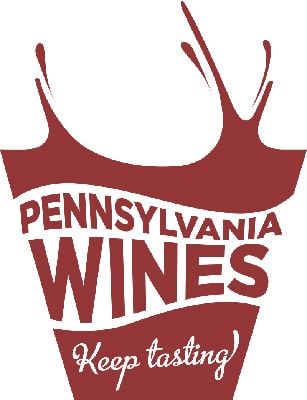
The Pennsylvania Winery Association (PWA) is a trade association that markets and advocates for the limited licensed wineries in Pennsylvania.
- Photos: Juniata Valley Winery
